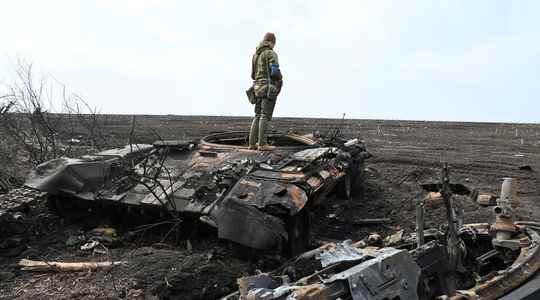The United States is expected to announce “substantial” financial assistance to Ukraine on Tuesday (November 29th) to help it repair the damage caused by Russian attacks on its energy infrastructure, senior US officials said. The aid, which will be detailed by Secretary of State Antony Blinken on the sidelines of a NATO meeting in Bucharest, the Romanian capital, “is substantial and it is not the end”, a senior official said on Monday. responsible to journalists.
NATO foreign ministers are meeting Tuesday and Wednesday in Bucharest where the alliance’s support for Ukraine since the Russian invasion will be discussed. Germany, which currently chairs the G7, called a meeting on Tuesday afternoon on the sidelines of the NATO rally to discuss the energy crisis caused by the war in Ukraine.
- The United States will release emergency aid for energy infrastructure in Ukraine
The United States is expected to announce “substantial” financial aid to Ukraine on Tuesday to help it deal with the damage caused by Russia to its energy infrastructure, on the sidelines of a NATO meeting in Romania, indicated senior US officials on Monday.
This aid, which will be detailed by the American Secretary of State Antony Blinken, who arrived Monday evening in Bucharest, “will be substantial and it is not over”, told journalists one of the senior officials speaking under the on condition of anonymity, refusing to give further details or the precise amount. However, he recalled that the Biden administration had budgeted $1.1 billion for energy in Ukraine and Moldova.
It is part of the prospect of an international conference of donors in “support for the Ukrainian civil resistance”, which will be held on December 13 in France, he underlined. Russia embarked in early October on a campaign of massive missile strikes targeting energy infrastructure across Ukraine. According to figures cited by the Ukrainian government, between 25 and 30% of this infrastructure was damaged.
- Macron back in the United States, to discuss Ukraine and protectionism with Biden
Emmanuel Macron is going to Washington on Tuesday for his second state visit, an “honor” which he hopes to take advantage of to push his diplomatic plea on the war in Ukraine and raise his voice against American protectionism. The Americans, for their part, will do everything to prevent the slightest friction or somewhat fresh statement from tarnishing the first state visit organized by Joe Biden.
The French president will be entitled to all the honors of such a reception on Thursday, with cannon shots, gala dinner and fireside chat in the famous Oval Office. John Kirby, spokesman for the White House National Security Council, on Monday praised this “dynamic” French president whose country, a nuclear power, is “at the center” of all global issues, be it the war in Ukraine or the rise of China.
- Canada to summon Russian ambassador over ‘hateful’ tweets towards LGBT+ community
Canadian Foreign Minister Mélanie Joly asked her services on Monday to summon the Russian ambassador to Ottawa, Oleg Stepanov, following a series of anti-LGBT+ tweets, including one targeting an openly lesbian federal minister.
Messages posted by the Russian Embassy’s Twitter account echo the Duma’s adoption last week of a bill banning any LGBT+ “propaganda”, or “promoting non-traditional sexual relations”. to all audiences, in the media, on the internet, in books and in films.
“The Russians have once again chosen hate propaganda,” said Emily Williams, spokesperson for Melanie Joly. “This is an attack on Canadian values of acceptance and tolerance. Minister Joly asked the department to summon the Russian ambassador to convey this message to him,” she added.
- Washington approves sale of missiles to Finland
Washington has approved the sale of more than 80 precision missiles to Finland for a total of $323 million, the State Department announced Monday, as the traditionally non-aligned country prepares to join NATO.
The Finnish government wishes to acquire 40 tactical missiles and 48 hovering guided bombs to equip its air fighter fleet and this sale of sensitive equipment had previously to be approved by the American government, the State Department said in a press release.
The AIM 9X Block II missile, known as “Sidewinder”, is an infrared-guided short-range air-to-air missile produced by Raytheon. The AGM-154 JSOW (“Joint standoff weapon”) is a medium-range precision hovering guided bomb, allowing firing at a safe distance (“standoff”), also manufactured by Raytheon.
- New Start Treaty: the meeting between Russians and Americans postponed indefinitely
The planned meeting between Russians and Americans to discuss the possible resumption of their inspections under the New Start treaty, a key nuclear disarmament agreement, has been postponed indefinitely, Russian diplomacy announced on Monday. “The session of the bilateral consultative commission on the Russian-American Start treaty, initially scheduled in Cairo from November 29 to December 6, will not take place on the dates indicated”, indicated the Russian Ministry of Foreign Affairs, quoted by the TASS agency.
“The event is postponed to a later date,” he added. According to Washington, Moscow did not justify postponing the Cairo meeting. “We haven’t received a real response from the Russians as to why they postponed it,” said John Kirby, spokesman for the White House National Security Council.
- Chemical weapons: War in Ukraine increases threat, says OPCW chief
Russia’s invasion of Ukraine has increased the threat of the use of weapons of mass destruction, including chemical munitions, the head of the global toxic weapons watchdog said on Monday. The Organization for the Prohibition of Chemical Weapons (OPCW) continues to closely monitor the situation in Ukraine, its head Fernando Arias said at the regulator’s annual meeting.
“The situation in Ukraine has once again heightened the real threat posed by weapons of mass destruction, including chemical weapons,” Fernando Arias said during the meeting at the organization’s headquarters in The Hague, Netherlands. “This has exacerbated existing tensions to a point where the unity of the international community on common global challenges related to international security and peace cannot be assumed,” he added.
